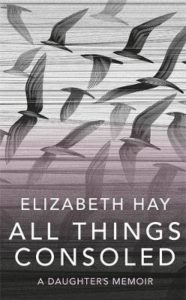 I was initially attracted to Elizabeth Hay’s memoir for the same reason I read Ann Patchett’s This is the Story of a Happy Marriage: I’d enjoyed several of her novels very much, in particular Late Nights on Air. Truth be told, though, aren’t we all fascinated by other people’s families, perhaps looking for similarities with our own or thankful that ours isn’t anything like the writer’s? Hay’s relationship with her parents had always been a tricky one but when they move across Ontario into a retirement home just down the road from Hay and her husband, she finds herself struggling with their slow decline into decrepitude. All Things Consoled is a recounting of those years and the family history that came before.
I was initially attracted to Elizabeth Hay’s memoir for the same reason I read Ann Patchett’s This is the Story of a Happy Marriage: I’d enjoyed several of her novels very much, in particular Late Nights on Air. Truth be told, though, aren’t we all fascinated by other people’s families, perhaps looking for similarities with our own or thankful that ours isn’t anything like the writer’s? Hay’s relationship with her parents had always been a tricky one but when they move across Ontario into a retirement home just down the road from Hay and her husband, she finds herself struggling with their slow decline into decrepitude. All Things Consoled is a recounting of those years and the family history that came before.
Gordon and Jean Hay married in 1943 when they were twenty-four. He was a history teacher, proud of his long career but never confident, strict both at home and at school. She became an artist, painting pictures of the natural world and enjoying a small degree of success while determined to carve out some space for herself. Hay was the third of their four children, seemingly locked in a difficult relationship with a father who found it impossible to praise her achievements and whose temper resulted in violent punishments until she was twelve. When the family spent a year in London, the world opened up to her, paving the way to university. Visits home to her parents were hedged about with disappointment and dismay at her mother’s apparent inability to stand up to her father’s irascibility. Her parents seem determinedly hunkered down in the family home but after a medical crisis and the beginnings of her mother’s dementia, they agree to move. It’s Hay who steps forward, taking responsibility although she’s unsure quite why she’s done so. For three years, she visits her parents daily, trying to cope with the sheer grind of caring for two people, themselves slowly ground down by the long slow process of extreme old age. Several years after her parents’ deaths, Hay sets down her reflections in the hope of coming to an understanding of her relationship with them.
I arrived at their rooms and here were the two vivid giants in my life – still massive no matter how shrunken they had become, while for them I suppose I had grown huge
Some of Hay’s descriptions will be all too painfully familiar to those whose own parents have endured a long decline or seen others at close quarters – hard enough when the relationship has been a good one. Inevitably, her book is as revealing about herself as it is about her parents, their scratchy yet close relationship and her attempts to understand them, particularly her father whose approval she’d craved and, eventually, realises she’d had all along. Hay’s use of langauge is as graceful in her non-fiction as in her fiction, and her demented mother’s poetic expressions are both poignantly apt and beautiful. It reminded me of Blake Morrison’s long-ago bestseller And When Did You Last See Your Father ?, no small compliment. We’re all unreliable narrators of our own stories but Hay’s memoir has a loud ring of truth about it. Let’s hope the writing of it helped soothe her hurts.


As you say, I think this will ring true for a lot of people, particularly with the rise in dementia. It’s so hard to get any perspective on our closest relationships isn’t it? It sounds as if Hay has tried to do that here and hopefully helped herself and others who read it.
I think it will be helpful. I was fortunate with my own father, and I lost my mother when I was very young but my partner had a very difficult relationship with his father who had a long slow decline. I’d recommend anyone in that position – well, everyone, really – to read Atul Gawande’s Being Mortal, sooner rather than later.
Noted!
I’m halfway through this now and enjoying it very much. There are so many funny moments alongside the awful ones — just like life, really. (A similarly balanced tone to Olive Kitteridge, which I’m also reading.)
Two fine reads, there! Glad to hear you’re enjoying them, Rebecca. That humour’s much needed, I think.
Elizabeth Hay, there’s a name from the past. I haven’t read anything of hers since A Student of Weather. I’m not going to attempt this because it is just too close to home, but I might look for some of her later fiction.
I’m always pleased when a British reader has heard of Hay! Late Nights on Air is still my favourite novel of hers.
I hope it won’t be too long before I get to this one!
I’d be interested to know what you think of it, Naomi. Always a risk reading an author’s non-fiction when you’ve loved their novels but it paid off for me with this one.
Pingback: Nonfiction Review Books Roundup: Hay, Hope et al., Lee, Long, McLaren, Zuckerman – Bookish Beck
Pingback: Announcing the NOT the Wellcome Prize and Blog Tour | Bookish Beck